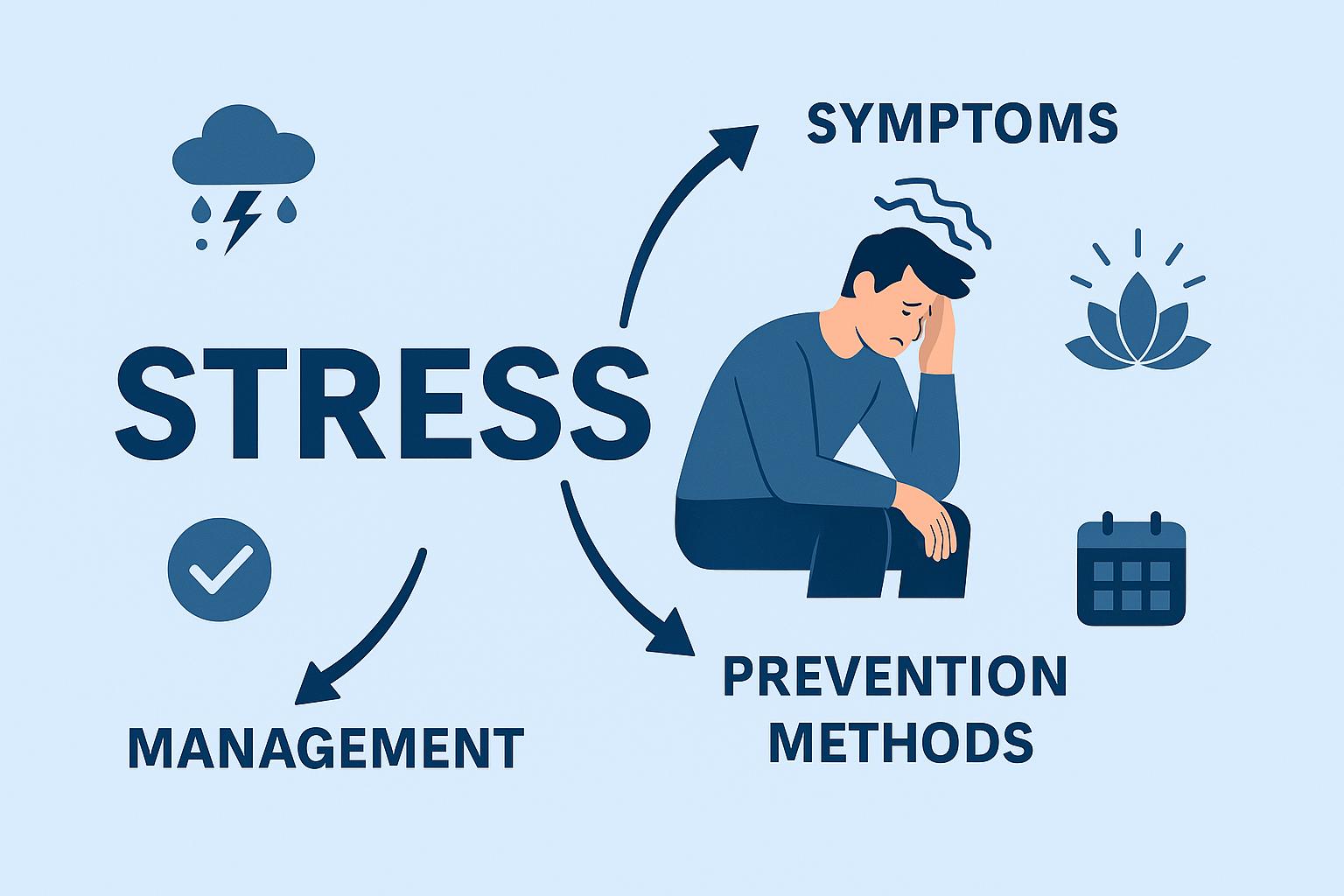Stress: Symptoms, Management, and Prevention Methods
Stress is the body’s response to life’s demands, affecting both mental and physical health. This article will explain what stress is, its impact on you, and practical ways to manage and prevent it. Understanding stress is crucial to enhancing your overall well-being.
Key Takeaways
- Stress can be categorized into three types: acute, episodic acute, and chronic, with chronic stress having significant health implications.
- Common stressors include both positive and negative life changes, and identifying these triggers is essential for effective stress management.
- Effective stress management strategies include physical activity, mindfulness practices, and building a robust support system to enhance resilience.
Understanding Stress and Its Impact

Stress is the body’s natural reaction to changes or challenges, triggering various physical and mental responses. There are three main types of stress:
- Acute stress: short-lived, often stemming from immediate challenges like a tight deadline or an argument.
- Episodic acute stress.
- Chronic stress: persists over longer periods and can lead to health issues.
Physical stress symptoms can include:
- Headaches
- Exhaustion
- Muscle tension
- Digestive problems
It’s not uncommon for people to experience stress rashes, often appearing as hives, which are more prevalent among younger adults. Chronic stress can also impair memory and focus, affecting cognitive functions. The autonomic nervous system regulates the body’s stress response, adjusting heart rate and breathing to cope with stress. For example, you might notice your heart rate increase and your breathing become faster before giving a public speech.
Recognizing the different facets of stress and its symptoms is crucial for effective management. Awareness of stress impacts on your body and mind allows for proactive measures to mitigate negative effects and enhance overall well-being.
If you recognize these symptoms in your own life, don’t wait for stress to take control. Book a free 15-minute call to discover immediate, practical steps to reduce your stress today.
Common Causes of Stress
Various factors, both positive and negative, can trigger stress. Life changes like starting a new job or losing one, as well as positive events like getting married or buying a house, can induce stress. Recognizing that not all stressors are inherently bad is important.
Daily challenges, such as preparing for an exam or dealing with minor mishaps, often result in acute stress, which is typically short-lived. Although usually manageable, this challenge can accumulate if not promptly addressed.
Situations creating constant pressure, like being late or juggling multiple tasks, contribute to everyday stress. Identifying these common causes can help manage your own stressors more effectively.
Identifying Stress Symptoms
Recognizing stress symptoms early is essential for entrepreneurs and business leaders striving for success in their business venture. Stress can manifest in various ways—physically, psychologically, and behaviorally. Many successful entrepreneurs report experiencing symptoms such as high blood pressure, muscle tension, headaches, and persistent anxiety due to the constant demands of leading a business. These stress symptoms can impact decision-making, productivity, and overall well-being.
Professional coaching and coaching leadership play a vital role in helping entrepreneurs develop self-awareness and identify these symptoms before they escalate. By understanding the importance of stress management and acknowledging how stress affects the body, entrepreneurs can take proactive steps to reduce stress and create a healthier, more productive work environment. Recognizing and addressing stress symptoms is the first step toward achieving long-term business success and personal well-being.
Running a business doesn’t mean running yourself into the ground. Let’s talk about how coaching can restore your energy and performance. Click here to book a call.
Long-Term Complications of Stress
Chronic stress can lead to a range of health issues, including anxiety and depression. The development of these complications is often a gradual process, resulting from prolonged exposure to stressors. The link between mental and physical health is strong; mental issues often contribute to physical ailments. For instance, extended exposure to stress hormones like cortisol can increase the likelihood of heart disease and high blood pressure.
Behavioral issues such as substance use disorders and compulsive behaviors are also common among individuals experiencing chronic stress. Muscle tension and pain are frequently reported symptoms, making everyday activities more challenging. Poor mental health due to stress can lead to decreased productivity and impair work performance.
Understanding the long-term risks of unmanaged stress highlights the need for proactive measures to reduce stress and enhance overall health. Addressing stress early can mitigate adverse effects, leading concerned to a healthier, more fulfilling life.
Don’t let stress silently steal your health and productivity. Let’s map a path forward—schedule your stress breakthrough session now.
Diagnosing Stress
Diagnosing stress typically involves subjective assessments and standardized questionnaires. Healthcare professionals often use validated tools like the GHQ-28 to evaluate mental well-being and identify stress-related issues, determining stress’s impact on daily functioning and quality of life. Enrolling in a course on stress management can also help individuals learn to identify and address stress symptoms early.
Signs that indicate the need for professional help include a lack of joy or engagement in activities, engaging in unhealthy coping behaviors, and difficulty in managing emotions. Sometimes, good friends can identify stress symptoms before the individual does, highlighting the importance of a supportive social network.
Effective Stress Management Techniques

Physical activities like aerobics or yoga can significantly alleviate stress and elevate mood. Exercise enhances self-confidence and overall well-being, vital for effective stress management. Setting specific, achievable fitness goals helps maintain a regular exercise routine, essential for stress relief.
Short bursts of physical activity throughout the day can reduce stress, even if long workouts aren’t feasible. Enjoyable physical activities increase the likelihood of sticking to an exercise routine, aiding in stress management. Incorporating mindfulness into physical activities enhances focus on body movements and breathing, further improving stress management. Different approaches to stress management, such as cognitive-behavioral techniques or relaxation exercises, can be tailored to individual needs.
Mindfulness practices like meditation can significantly boost self-awareness and aid in stress management. Recognizing stressors through self-awareness allows for better stress response management. Enhanced self-awareness improves decision-making by opening a ‘window of awareness,’ enabling thoughtful responses to stress and fostering a positive mindset.
Journaling thoughts and feelings effectively increases self-awareness by focusing on identifying stressors and also focuses on personal growth.
Mindfulness and Relaxation for Stress Relief
Mindfulness and relaxation techniques are powerful tools for reducing stress and enhancing overall well-being, especially in the fast-paced world of business. Many successful startups have made mindfulness and relaxation a core part of their company culture, recognizing the positive impact these practices have on both individuals and teams.
Examples of mindfulness and relaxation techniques include meditation, deep breathing exercises, and engaging in physical activity. These practices help entrepreneurs and their teams manage stress, maintain focus, and achieve a healthier work-life balance. Participating in a coaching journey or taking advantage of professional development opportunities can provide entrepreneurs with the resources and tools needed to incorporate mindfulness and relaxation into their daily routines.
By focusing on mindfulness and relaxation, entrepreneurs can lead their teams more effectively, foster a positive company environment, and create lasting benefits for their business and personal life.
Mindfulness works best with guidance. Let’s explore which practices suit your lifestyle—book your free call today and take the first step toward calm clarity.
Time Management Strategies for Stress Reduction
Effective time management is a cornerstone of reducing stress and achieving success in business. Many successful entrepreneurs attribute their accomplishments to strong time management skills, which allow them to seize business opportunities and drive their new venture forward.
Examples of time management strategies include setting clear goals, prioritizing tasks based on importance and urgency, and avoiding procrastination. Professional coaching and coaching leadership can help entrepreneurs develop these skills, creating a more efficient and productive work environment. By managing time effectively, entrepreneurs can reduce stress, increase productivity, and open the door to new business opportunities.
According to the Chicago Press, time management is a critical factor in determining the success of a new venture. By mastering these strategies, entrepreneurs can create a sustainable path to business growth and personal achievement.
Want to gain back control of your time and lower your stress? In just 15 minutes, I’ll show you how. Book a free call now.
Building Resilience Against Stress
Building resilience is essential for entrepreneurs who want to thrive in the face of business challenges. Resilience means developing the mindset and skills needed to cope with setbacks, adapt to change, and keep moving forward. Many successful entrepreneurs prioritize resilience as a key part of their business strategy.
Participating in a coaching journey or engaging in professional development opportunities can help entrepreneurs build resilience and foster a growth mindset. Examples of resilience-building strategies include developing self-awareness, learning from failure, and maintaining a positive attitude even during tough times. By focusing on these approaches, entrepreneurs can reduce stress, improve their mental health, and create a more sustainable business model.
The importance of resilience cannot be overstated—successful entrepreneurs understand that developing resilience is crucial for long-term business success and personal well-being.
Resilience can be built—and I’ll show you how. Book your free resilience breakthrough call to get started.
Emergency Situations: Coping with Acute Stress
Emergency situations—such as natural disasters, financial crises, or personal emergencies—can trigger acute stress, which may feel overwhelming and difficult to manage. For entrepreneurs, these high-pressure moments can threaten both personal health and business stability. Recognizing the symptoms of acute stress and knowing when to seek emergency help is vital for maintaining control and moving forward.
Professional coaching and coaching leadership can provide entrepreneurs with the support, resources, and strategies needed to manage acute stress effectively. Having a plan in place for emergency situations—such as clear communication protocols and access to support networks—can help reduce stress and ensure business continuity.
It’s important for entrepreneurs to prioritize their mental health and seek help when needed to prevent depression and other long-term health concerns. If you or someone you know is experiencing a crisis, the 988 Suicide & Crisis Lifeline is available by calling or texting 988 for immediate support. By taking proactive steps and utilizing available resources, entrepreneurs can manage acute stress, maintain control, and keep their business and personal life on track.
Professional Help for Stress Management
Coaches assist clients in achieving personal or professional goals on their coaching journey, effectively managing stress. Business coaching enhances personal effectiveness, helping executives and management reach specific professional coaching goals. Some coach are both certified and licensed counseling psychologists, providing broader support in stress management.
Health coaches guide individuals with chronic conditions towards behavioral changes and reduced health risks through effective training, managing health-related stress. Collaborating with a team of professionals, such as coaches, therapists, and health coaches, can provide a more holistic approach to stress management.
Building a support system before crises arise makes it easier to rely on established relationships that were created while developing emergency help during difficult times to create a stronger foundation, especially when everyone is present and involved.
You don’t have to navigate this alone. A quick 15-minute call can clarify your next step. Schedule your call here.
Creating a Stress-Resilient Lifestyle

Healthy relationships with family and friends provide crucial support and guidance during tough times. A responsible relationship strong network can enhance resilience and improve overall well-being, leading to greater rewards.
Good sleep hygiene reduces stress, improves decision-making, and enhances productivity. A balanced diet stabilizes energy levels and mood, aiding in effective stress management. To achieve these benefits, it is essential to set goals.
Regular physical activity boosts mood and energy levels, serving as an effective stress management tool. Activities that instill a sense of purpose improve daily motivation and resilience. Individuals running their own business often need to be especially mindful of lifestyle choices to maintain resilience and prevent burnout.
The Role of Self-Awareness in Stress Management
Self-awareness helps individuals identify their strengths and areas for improvement, fostering personal growth. Entrepreneurs benefit from acknowledging personal stress signals to identify and address stressors. Enhanced self-awareness aids in better stress management and overall well-being.
Understanding stress triggers through self-awareness enables proactive stress management strategies. This control over stress responses leads to a more balanced and fulfilling life.
Building a Support System

Professional support is crucial for dealing with trauma, grief, or significant loss. Building relationships with friends and family provides emotional support and alleviates isolation for entrepreneurs. Therapists help develop healthy boundaries and communication skills to enhance relationships and provide a valuable education service.
Support groups and networks provide the following benefits to entrepreneurs:
- Enable sharing of experiences and strategies, significantly alleviating isolation.
- Offer practical assistance, such as advice and guidance.
- Enhance security during uncertain times through various services.
Entrepreneurial Stress: Challenges and Solutions

Entrepreneurs play a crucial role in the economy by anticipating needs and bringing new product ideas to market. Businesses of all sizes contribute to economic growth, foster innovation, and create employment opportunities. However, an entrepreneur faces unique stressors such as funding challenges, market risks, and business scalability pressure. Proper cash flow management is essential for a new ventures business’s survival and growth in the realm of entrepreneurship, especially when it comes to managing money. Securing funds from sources such as venture capitalists, angel investors, or crowdfunding is often critical for business growth. Negotiating a favorable deal, whether it’s a partnership, franchise, or financing agreement, can be a pivotal moment for an entrepreneur.
Networking can significantly reduce the time to achieve business success by connecting entrepreneurs with key resources. Companies often collaborate or compete to create new markets and drive social change. Successful entrepreneurs exhibit decisive decision-making and effective financial risk management in their venture, showcasing innovation.
Well-rounded teams help entrepreneurs address shortcomings and improve overall business performance for the company, creating a positive impact in the industry with this idea, moving forward.
Summary
In summary, understanding stress and its impact, recognizing common causes, and being aware of the long-term complications are essential first steps in managing stress. Effective management techniques, professional help, and building a supportive network can significantly reduce stress and improve overall well-being.
Creating a stress-resilient lifestyle and fostering self-awareness are crucial for long-term stress management. By taking these proactive steps, you can lead a healthier, happier, and more productive life. Remember, managing stress is a continuous journey, but with the right tools and strategies, you can navigate it successfully.
Stress isn’t going away—but you can change how you handle it. Click here to book your free 15-minute strategy session and let’s create your personalized action plan.
Frequently Asked Questions
What are the main types of stress?
The main types of stress are acute, episodic acute, and chronic. Acute stress is brief, episodic acute stress occurs in repeated episodes, and chronic stress lasts for an extended period, potentially impacting health.
How can I identify if I need professional help for stress?
If you find yourself lacking joy in activities you once enjoyed, relying on unhealthy coping mechanisms, or struggling to manage your emotions, it may be time to seek professional help for stress. Recognizing these signs early can be crucial for your well-being.
What are some effective stress management techniques?
Effective stress management techniques include engaging in physical activities like aerobics or yoga, practicing mindfulness, and setting achievable goals. Incorporating these practices into your routine can significantly enhance your well-being.
How can self-awareness help in managing stress?
Self-awareness enhances your ability to identify stress signals and triggers, ultimately enabling you to manage stress more effectively. By understanding your responses, you can implement better coping strategies for improved well-being.
Why is building a support system important for stress management?
Building a support system is crucial for stress management because it offers emotional support and practical assistance, reducing feelings of isolation and enhancing your sense of security during challenging times.



